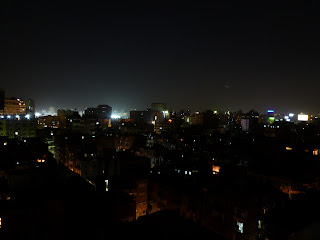I am going to spend the second month of my stay in the heart of Heliopolis, a beautiful and relatively calm quarter in the north east of Cairo which was started by Belgians in 1905, their traces are still to be seen in the eclecticistic architecture in the oldest parts of it. My host family lives in one of the apartment blocks around St. Fatima Square. The red brick stone church of St. Fatima is a landmark, but only one of many beautiful churches in the area. Here broad streets are lined by many different small shops, the houses are not too high and there are quite a lot of nice trees compared to many other parts of the city. It’s easy to enjoy life here.
And it’s nice to have an everyday rhythm and especially nice to thus have some fresh air and what is my ideal summer temperature when leaving the house around seven in the morning. At least in the shade of houses and trees it is probably not warmer than 25 degrees. Not many people are going anywhere at this time, but a calm constant activity is underway along the streets, mainly men washing cars. Not their own ones, to be clear. They are the porters, the bawaabs, an Egyptian institution. Every apartment house I know has a bawaab. He has an eye on who enters and leaves the building, takes care of the garbage and sometimes he would run some errands for the people who live in the building and pay him. And he cleans the cars – very often, probably necessary in the dusty air of Cairo – and rearranges them in the always scarce parking space.
It is also good to live in a family again and share food and thoughts or just company while reading and studying with nice people on a daily basis. Sometimes we go out in the evenings to visit relatives or my host sister and I go to a café and drink juice in the comfortable evening warmth.
After a week in the hospital a Wednesday afternoon, my Friday equivalent, spent at the club with my host sister and her friends is the first part of a deserved and relaxing weekend. Luckily the Wednesday is the women’s afternoon in the pool of the large sports club Ash-Shams (The Sun) my host family belongs to – it has close to a million members and the elections of its board get mentioned on local television. I finally get the possibility for some exercise in the fifty meter swimming pool sparkling in the warm sun. When the women’s hours are over we go to the sauna, 63 degrees centigrade it says, nice and relaxing, not really hot.
After a week in the hospital a Wednesday afternoon, my Friday equivalent, spent at the club with my host sister and her friends is the first part of a deserved and relaxing weekend. Luckily the Wednesday is the women’s afternoon in the pool of the large sports club Ash-Shams (The Sun) my host family belongs to – it has close to a million members and the elections of its board get mentioned on local television. I finally get the possibility for some exercise in the fifty meter swimming pool sparkling in the warm sun. When the women’s hours are over we go to the sauna, 63 degrees centigrade it says, nice and relaxing, not really hot.
The next thing on this weekend is the graduation of two friends! There are about 500 graduates in their year and the ceremony is held in a huge hall of Cairo International Conference Center. To me their caps and gowns look American, but they do not perceive it as something new or foreign, they are rather astonished that we don’t have this in Germany. I do understand Injy’s speech on as a student representative, the rest is in Arabic, so I am free to watch and listen to the name combinations as every graduate is called to collect his certificate from the principal and his board. A complete Arabic name consists of the names of father, grandfather and great grandfather in paternal lineage. Quite often names repeat themselves within these sets.
Tossing their caps
As a conclusion to this weekend I spend what feels like a perfect Sunday (actually it’s Friday, of course). After the service we have lunch at a traditional Yemenee restaurant in Doqqi (only the ride there was one of the less nice experiences with Cairo taxi drivers, he didn’t know even the medium sized streets of the area, but wouldn’t admit it and also wouldn’t take directions…). The lunch in an exceptionally large group including some kids is also a first stage of saying farewell as one of the friends I met here will go to Europe for some weeks after a few days, so I will only see her again in 2012, inshallah.
After lunch I meet Ahmed, one of the new graduates and we go to one of the clubs, as he is half Australian, it’s the Australian club in Mohandeseen. We drink juice in the shade of the high trees update each other on what’s been going on in our lives and darkness, as always, astonishes me as it falls early and quickly. We return to Zamalek to see a marionette Beatles concert at El Sawy Culturewheel culture center. This center has been bringing high quality music, art, discussions and workshops at a reasonable price to this part of the city since 2003. The marionette playback show also is hilarious, the half professional puppet players do a great job in getting the Fab Four back on stage, true to the extent of such details as Ringo’s head movements. The evening ends cheerfully with some more friends at a small waffle shop (besides the common toppings they melt your favorite chocolate bar on a waffle, now, don’t Egyptians know how to eat?).









